Grocery Store on Wheels Tackles Food Access Challenges in Riverside and San Bernardino
April 18, 2016 | Annamarie Sysling
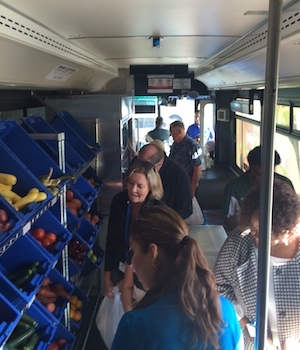
Mobile Fresh FSA customers shop for fresh and healthy food in Riverside. (Photo courtesy of Joey Romero, Program Director for Mobile Fresh FSA)
Increasing access to fresh and healthy food in “food deserts,” defined as low-income urban areas where a substantial number or share of residents has very limited access to a large grocery store or supermarket, requires creativity, resourcefulness and drive. And it is drive that resulted in the creation of a grocery store on wheels that enables Moreno Valley-based Family Service Assocation (FSA) to tackle trenchant food access problems in Riverside and San Bernardino, two of the largest counties in the United States.
Family Service Association (FSA), an organization that builds community “one family at a time, through compassion, advocacy and comprehensive model services, fostering self-sufficiency and sustainable impacts,” launched mobile fresh market pilot project, Mobile Fresh, in December 2013. Program Director Joey Romero says at the time, Mobile Fresh was run out of a van, and FSA advertised the new mobile grocery service at some of its offices and local child care and community centers. “We parked, put a table out there and put out some fresh fruits and vegetables,” recalls Romero.
Applying for grants, along with implementing a sustainable plan to bring fresh food to residents of Riverside and San Bernardino Counties took about one year. But, shortly after its launch Mobile Fresh received a considerable boost when the Riverside Transit Agency committed to donating a 40-foot-long commuter bus to FSA’s Mobile Fresh Program. “So we jumped into action to try to get some funding to retrofit the bus, and we did,” says Romero. The funding came from partners including the United States Department of Agriculture, Walmart, Wells Fargo, Union Pacific and Bank of America.
Transforming the bus into a mobile grocery store meant removing all of the seats, creating shelving and installing a generator for refrigerated items. Romero says being able to offer customers items such as milk, eggs and cheese was a necessary part of the mobile grocery service becoming Electronic Benefits Transfer (EBT) certified.
The Mobile Fresh bus, which runs from March through September, stops at apartment complexes, city hall buildings, libraries, mobile home parks and senior centers. A few months after the 2014 launch, Mobile Fresh was visiting 17 different locations within Riverside and San Bernardino Counties. The number of Mobile Fresh stops eventually climbed to 40. Romero says a little more than half of those stops are at senior centers. “We realized that the seniors not only live in rural areas, but their access issue is amplified because they don’t drive,” he says.
In addition to combating food access and security problems, Mobile Fresh is also helping customers eat healthfully and affordably. Romero says, “sometimes these seniors are making the decision between ‘do I eat or do I buy my medicine?’” Some of the grants that the program has received help to reduce the cost of food, and partner organizations, local distributors and occasionally grocery stores also donate various items to Mobile Fresh. Romero says it also helps to give customers an added incentive to purchase fresh and healthy food, which is why the program always tries to include a free item with any purchase.
“Giving access is not enough, we have to […] give it to them at a cheap price and take it one step further and show them how to use it,” explains Romero. When available, recipes and informational cards are included with purchases to help customers learn how to incorporate a new ingredient into an old recipe. He says program aids and drivers regularly offer their own cooking tips to customers who are unfamiliar with one item or another.
The Mobile Fresh programs continues to grow and the FSA team is constantly refining its service to improve efficiency and outreach; but there are always challenges. Romero says hot weather is an ongoing obstacle. The bus has had broken air conditioners, breakdowns and spoiled food when the generator –and refrigerator– can’t handle the heat. On days when it’s more than 100 degrees outside, Romero says produce spoils quickly from having the bus doors open long enough for people to shop at each location. Yet, despite these setbacks Mobile Fresh reached about 10,000 people in 2014, and 2016 projections indicate that number will increase to between 15,000 and 20,000.
“We visit locations either once a week or once every two weeks, so there are repeat customers; but it’s still amazing to hear people say, ‘This is our first time here!’” says Romero. Mobile Fresh and Romero hope to continue to increase food access to Riverside and San Bernardino residents, and hopefully add a few more buses to the program.

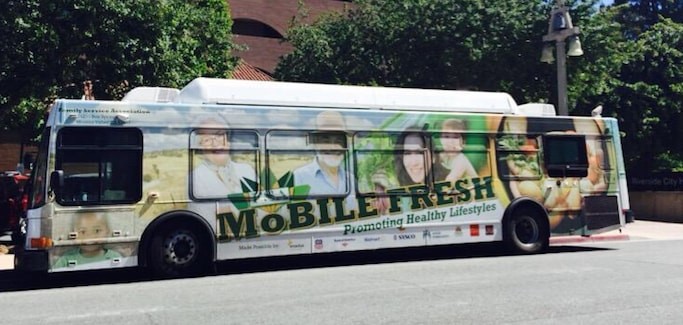

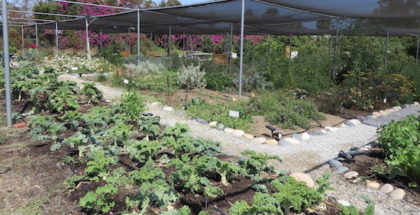
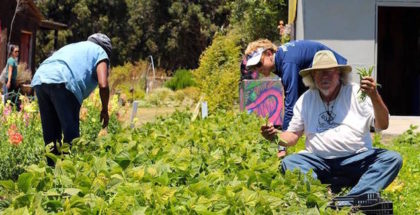
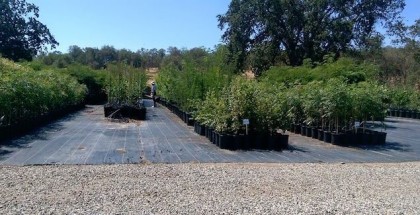








Submit a Comment